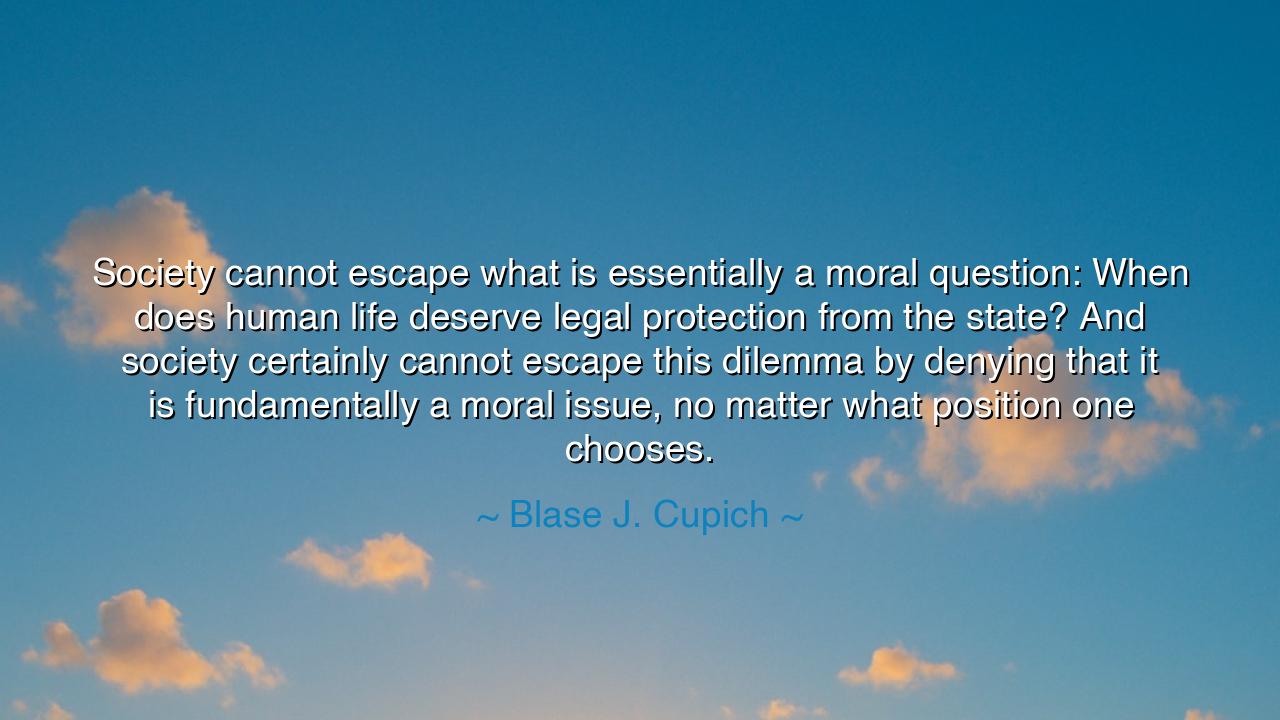
Society cannot escape what is essentially a moral question: When
Society cannot escape what is essentially a moral question: When does human life deserve legal protection from the state? And society certainly cannot escape this dilemma by denying that it is fundamentally a moral issue, no matter what position one chooses.






The words of Blase J. Cupich pierce through the noise of politics and philosophy alike: “Society cannot escape what is essentially a moral question: When does human life deserve legal protection from the state? And society certainly cannot escape this dilemma by denying that it is fundamentally a moral issue, no matter what position one chooses.” In this single reflection lies a truth as ancient as law itself — that every civilization must one day confront the sacred boundary between life and law, between the power of the state and the conscience of the soul. His words remind us that while societies may grow in knowledge and power, they cannot grow beyond the reach of morality.
From the dawn of humanity, men and women have asked the same question beneath different names: What is life, and when does it become sacred? In the temples of old, philosophers debated the spark of the soul; in the courts of kings, judges wrestled with who deserved mercy and who deserved protection. Cupich’s words remind us that this is not merely a question of legislation — it is a question of conscience, of what kind of people we wish to be. When a society forgets that its laws must be rooted in morality, it begins to legislate convenience instead of compassion, and in doing so, loses its moral compass.
The dilemma he names — when does human life deserve legal protection — has echoed across centuries. It has shaped debates over war, punishment, slavery, and the rights of the unborn. In every age, the form changes, but the essence remains: who among us will we choose to see as fully human? In ancient Rome, the law decreed that certain people — slaves, prisoners, the poor — had no standing before the courts. The result was not order but decay, for a society that denies the humanity of even one group of people slowly poisons its own soul. To defend human life at all stages is not a matter of ideology; it is the foundation of moral civilization.
History offers us lessons written in both glory and blood. Consider the horror of the Holocaust, when an entire state sought to redefine humanity itself. The machinery of law was twisted into the machinery of death, and bureaucrats justified their cruelty as mere obedience to order. Yet, amid that darkness, a few stood firm — people like Oskar Schindler and Irena Sendler, who defied the law to obey a higher truth. Their courage revealed what Cupich means when he says society cannot escape the moral question. The state may define legality, but morality defines humanity.
To deny the moral nature of such questions, Cupich warns, is to flee from responsibility. One cannot hide behind neutrality, for neutrality itself becomes a moral choice. To say “this is not a moral issue” is to close one’s eyes while others suffer. Whether the matter concerns the unborn child, the condemned prisoner, or the abandoned refugee, the question remains the same: When does life demand our protection? This is the mirror held up to our civilization. The answer we give determines not only our laws, but our legacy.
True moral courage demands that we wrestle with these questions, even when they divide us. It demands that we listen, not merely to reason, but to the quiet voice of conscience. The ancients taught that justice without virtue becomes tyranny; law without love becomes cruelty. To recognize life as sacred is not to surrender to sentiment, but to rise to responsibility — to remember that every heartbeat carries infinite worth.
Let this be the lesson passed down to those who come after us: laws may guide a nation, but morality guards its soul. A just society must never turn away from the difficult questions of life and dignity. Instead, it must face them with humility, empathy, and reverence for truth. Each of us, in our own way, must defend life where it is most fragile — not because it is easy, but because it is right.
So, my child of the future, remember this: you cannot escape the moral question, for it follows every choice you make. To act without conscience is to live without light. But to stand for life — to honor the sacred in every person — is to align yourself with the divine rhythm of creation itself. For in protecting human life, we protect the very meaning of what it is to be human.






AAdministratorAdministrator
Welcome, honored guests. Please leave a comment, we will respond soon